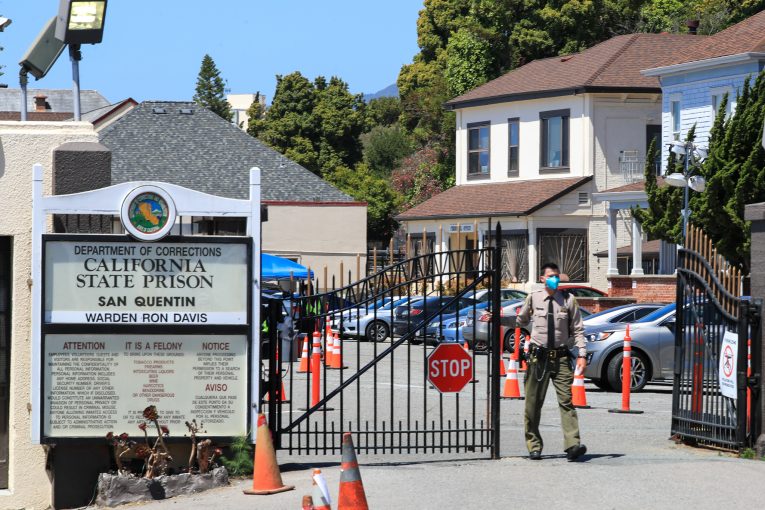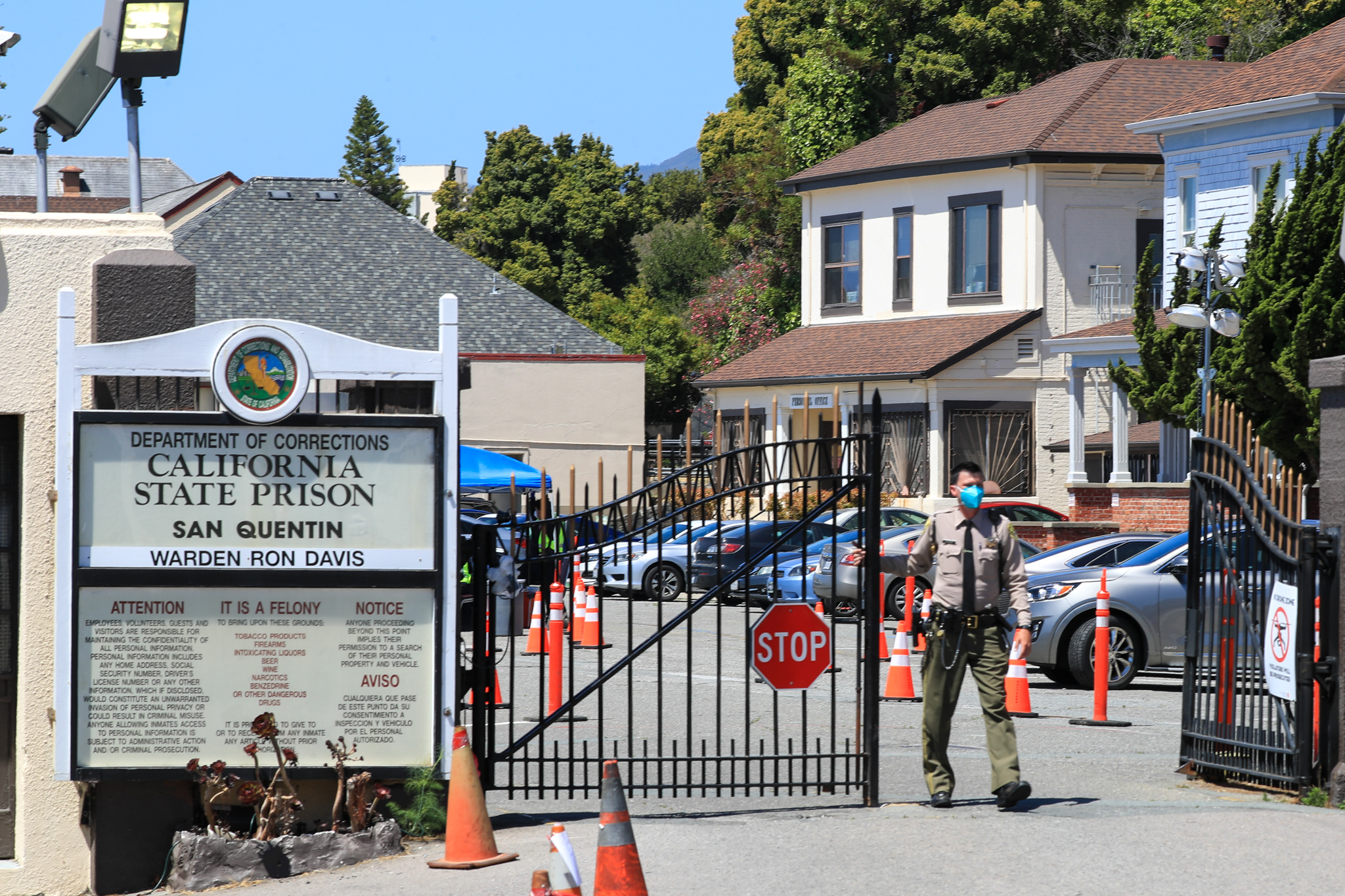
 Alison Pachynski sees the California prison as a “phoenix rising from the ashes”
Alison Pachynski sees the California prison as a “phoenix rising from the ashes”
By Joe Garcia
Dr. Alison Pachynski started working at San Quentin State Prison (SQ) as a primary care provider in 2007 after a University of California San Francisco colleague saw her potential for community medicine and suggested she give the job a try.
“At the time, there was a lot of cleanup work going on as far as healthcare inside the California Department of Corrections and Rehabilitation (CDCR) because of the ongoing Plata litigation,” she recalled, referring to the 2001 class action lawsuit that was filed on behalf of California prisoners alleging that overcrowding in the state prisons violated the Eighth Amendment ban on “cruel and unusual punishment.”
Pachynski’s detour into SQ turned into a career choice.
“I didn’t see working here as permanent back then, but I found my patients so compelling — so resilient,” she said. “There’s a humanity and heart that’s still alive in here. You guys are amazing.”
When she accepted the position as SQ’s acting chief medical executive in 2019, COVID-19 lurked just beyond the horizon. Dr. Pachynski soon found  herself front and center inside one of the worst viral outbreaks in prison history.
herself front and center inside one of the worst viral outbreaks in prison history.
In September 2021, CDCR awarded Pachynski a Medal of Valor and named her 2021 Health Care Professional of the Year for maintaining “a positive approach and an uplifting leadership style” throughout SQ’s COVID-19 emergency.
Known for taking time to stop and talk freely with incarcerated community members — all of whom she considers her patients — Dr. Pachynski sat down for a Q&A with San Quentin News to discuss the current state inside San Quentin.
Q: With flu season approaching and all these different variants popping up, how do you feel about where SQ’s at in terms of COVID-19 safety right now?
Pachynski: I worry most about our unvaccinated patients. They probably had COVID-19 already, but that doesn’t mean their natural immunity’s as powerful as the vaccine. We’re still learning about those kinds of factors.
Delta’s been the worst so far because of how infectious it is, but we seem to have made it through that wave fairly well. I don’t know what’s around the corner — nobody does.
The last small outbreak had me worried. But you guys have been great with testing and vaccinations. We have tools we didn’t have back then. Availability of tests and vaccines are at the top of the list.
Q: You surprised a lot of us when you came into the Alpine unit during a small outbreak in August. Why’d you go around to every cell answering questions and pushing to get folks vaccinated?
Pachynski: I just felt compelled to be there. I know if I were in your situation, with a potential new outbreak about to blow up, I’d be anxious.
It was scary. We didn’t know what delta would look like.
The people who aren’t vaccinated — it weighs on me. Even early vaccination starts protecting them right away.
Q: Do you think everyone who was at SQ during the 2020 outbreak had COVID-19 regardless of whether they ever tested positive?
Pachynski: I don’t know how anybody could’ve escaped it given these housing units. In our dorms, that was a completely different story. We only had three cases. But think about the closed dorms, the term we use for cells with open bars.
Q: Some of us avoid testing because of false positives and the threat of being housed in the Adjustment Center (also known as the “AC,” where prisoners are held in solitary confinement at San Quentin) for 14 to 21 days.
That last outbreak in August, I know guys that were woken up and moved to the AC at 2 a.m. Why did it have to happen like that?
Pachynski: I wish I had a better solution, but we have to move people as quickly as possible into a closed-in space with solid doors.
As soon as those test results hit the electronic health record, the public health unit alerts the custody unit. I’m always on call, so half the time I’ll get woken up, too.
Q: Have you ever sat in one of those AC cells and thought about solitary confinement?
Pachynski: Yeah, I’ve done that, but I never had the door closed. I can see how the feelings of isolation set in day to day and hour to hour.
You should have the same privileges within the confines of isolation. You’re supposed to have the same privileges. Testing positive for COVID-19 shouldn’t change your level of custody, but I don’t oversee custody.
Q: At some point, there’ll be an event inside SQ in recognition of the 28 people in blue (the color of the uniform that prisoners wear), who died from COVID-19. You’ve been asked to speak, and you said yes. Why is that important to you?
Pachynski: COVID-19 impacted the entire institution — no matter who you are here. No one has ever been through this before.
There are things I think need to be acknowledged — mainly the strength and endurance of our community.
But it’s still so painful. How do you put that into words?
Q: Knowing what you know now, what would you have done differently?
Pachynski: Oh, heavens — I would have physically stood at the gates and figured out a way to block entry (of the buses from the California Institution for Men that brought COVID-19 into SQ in May 2020).
Q: What about the policy of allowing staff to work and move from unit to unit?
Pachynski: Cohorting staff? That’s exceptionally complicated. I’ve had so many higher level discussions about it. It boils down to a labor issue and how a place actually runs.
I’ve thought about the cohorting issue a fair amount with my staff. It would greatly limit our ability to provide coverage everywhere.
That’s where proper use of personal protective equipment comes in. My team, my doctors — we know the importance of taking precautions to keep our patients safe from us.
Q: What’s your opinion on this place going all single cell?
Pachynski: From a public health perspective, it certainly makes everything easier. But I understand corrections is also a business, right?
I’ve taken new medical staff into the buildings and had them climb onto an upper bunk. They need to understand. Lower bunk/upper bunk — that makes a difference in a patient’s everyday quality of life.
I’m five feet, four inches tall, and there wasn’t much room in there for me. I can’t imagine how two people function in a cell that size, day in and day out.
Q: Given what we know about American Correctional Association standards, why isn’t SQ going completely single cell across the board for all residents?
Pachynski: I don’t make those decisions. My understanding is that SQ’s population numbers are determined at headquarters. As far as who, exactly, ultimately controls that decision, I don’t know.
Q: When the incarcerated community criticized SQ’s COVID-19 response last year, both you and Warden Ron Broomfield got vilified — especially with regards to your testimony during the Marin County hearings. What are your thoughts on that?
Pachynski: That actually kind of hurts me to hear that. But I also understand it.
As far as the medical department goes, we’re very nose to the grindstone. We just take care of our patients the best way we can while everything else is going on.
Q: How do you feel about being named Health Care Provider of the Year?
Pachynski: I appreciate the recognition, but it really was a team effort. We have a devoted team of doctors who all stepped up — working around the clock 24/7 during that terrible time.
I hope our patients realize how much our providers care about them.
Q: You seem genuinely invested in our community. What’s your vision of SQ’s future?
Pachynski: I’m totally all in, 100%. We braced for impact as best we could. COVID-19 did a real number on us. It’s going to take a lot to recover as a community.
People are sicker — from the whole situation, the shutdown, the lack of physical activity. They gained weight and generally became less healthy all the way around.
But I see SQ as that phoenix rising from the ashes. What do we do from here? I just feel the potential of this place. We can lead the way.
This story was originally published by San Quentin News, a prison newspaper that reports on rehabilitative efforts to increase public safety and achieve social justice from inside San Quentin State Prison.
